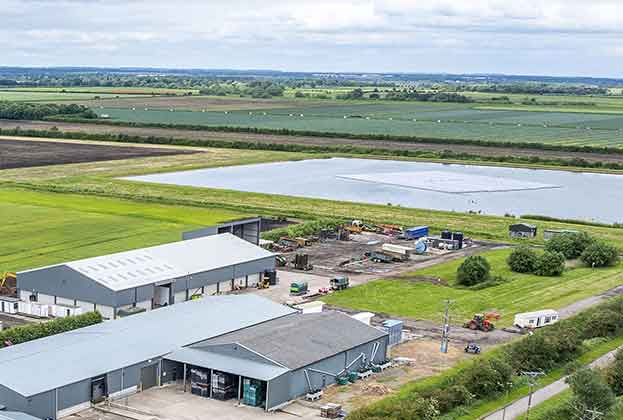Regenerative agriculture and sustainable water metering
- Four metering systems that record data in real time have been installed on the farm
- £5,000 a year savings through leak detection alone
Longbridge Regenerative is a collection of businesses pioneering a circular economy philosophy based around farming, education and water. Founded by Duncan Ellis, third-generation farmer of the 3,500-acre Church Farm in the South Downs National Park, Longbridge Regenerative is creating interconnected links between natural systems in order to establish systematic change and build long-term resilience both in business and landscape.
All Longbridge Regenerative businesses strive to use water conscientiously, including the award-winning Long Man Brewery, co-founded by Duncan. The brewery uses approximately four million litres of water per year. Its wastewater is collected, treated and used to help irrigate crops on the farm. The 150 tonnes of ’spent grain’ from brewing is fed to the farm’s livestock, and any surplus is composted.
Long Man brews using regeneratively farmed barley, grown on site, on a no-till basis. Using nature’s natural cycles and biodiversity to lock in carbon, maintain a healthy worm population and prepare the soil for growing barley. The farm has sustainability at the core of everything it does, so taking a closer look at its water use was the natural next step.
Trialling new, innovative technology
All the water used on the farm is drawn from the aquifer beneath the chalk downs. The chalk geology filters the water and is a nature-based solution to the water resourcing problem. If managed carefully, the aquifer is a sustainable source of water and is of naturally high quality.
With the supply of water being so central to the businesses, Longbridge Regenerative has engaged with South East Water to trial new, innovative technology that aims to provide live data on water use and alert the business to potential leaks. Previously, if there was a water leak on the farm, it would not have been detected until the bill was received, potentially costing the business thousands of pounds; catastrophic from a financial perspective and, of course, a waste of water.
The farm has sustainability at the core of everything it does, so taking a closer look at its water use was the natural next step
Duncan Ellis, Longbridge Regenerative
Four metering systems, which record data in real time, have been installed on the farm, measuring how water is used across the different parts of the business. Small solar panels power part of the system, minimising the project’s carbon footprint and running costs.
South East Water wants to form partnerships to manage water supplies in a more sustainable way to reduce demand. It covered the initial costs of trialling the meters at Church Farm, which expects to make savings of about £5,000 a year through leak detection alone, giving a real business case for other land-based businesses to take a similar approach.
The farm and South East Water intend to install a rainwater harvesting system, to capture rainwater (green water) from barn roofs to use for livestock drinking. They also hope to install further remote meters, allowing Duncan and his team to measure the amount of rainwater being captured and provide a clearer idea of the total amount of water being used across the farm – from both mains water and rainwater.
“We believe that by looking after the environment around us and sourcing everything we possibly can locally, we can produce naturally excellent beer, as well as give back to the land and community we rely on to sustain our business.”
Read the articles within Water: building resilience below.
.jpg)




